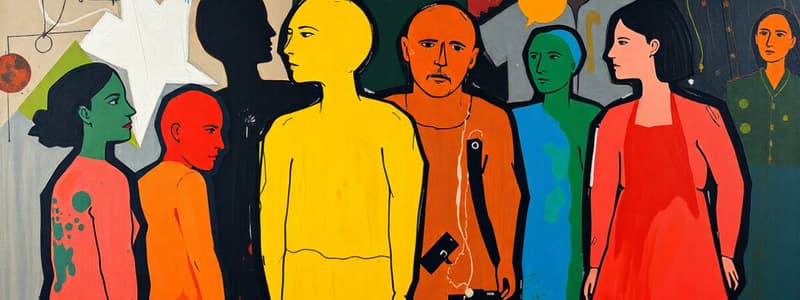Podcast
Questions and Answers
What is a primary role of culture in society?
What is a primary role of culture in society?
- To create a framework for shared beliefs and practices (correct)
- To eliminate all forms of deviance within a social group
- To enforce strict compliance with laws and regulations
- To discourage social organization and cohesion
Which of the following best describes social organization?
Which of the following best describes social organization?
- A hierarchical structure that limits individual freedom
- The organized relationships and patterns among individuals in a group (correct)
- An unstructured collection of individuals with no common goals
- A transient network that dissolves quickly without forming bonds
What is considered deviance in a social context?
What is considered deviance in a social context?
- Actions that are universally accepted across cultures
- Any behavior that violates societal norms or expectations (correct)
- Behaviors that are flexible and context-dependent
- Behavior that conforms to societal expectations
Which of the following describes social control?
Which of the following describes social control?
How does culture influence deviance?
How does culture influence deviance?
Flashcards
Culture
Culture
Shared beliefs, values, customs, and behaviors of a group of people.
Social Organization
Social Organization
The structure of relationships and groups within a society.
Deviancy
Deviancy
Actions or behaviors that violate social norms or expectations.
Social Control
Social Control
Signup and view all the flashcards
Relationship between culture and social organization
Relationship between culture and social organization
Signup and view all the flashcards
Study Notes
Culture and Social Organization
- Culture shapes social interactions, values, norms, and beliefs. It influences how individuals perceive and respond to various aspects of their environment.
- Culture is transmitted through generations, primarily through socialization processes, including family, education, and institutions.
- Social organization refers to the established patterns of social relationships and structures within a society. It dictates roles, responsibilities, and expectations within various social groups.
- Family structures, organizational hierarchies, and political systems are examples of social organizational elements.
- Social norms are unwritten rules that dictate acceptable behavior within a culture. These are learned and enforced by social sanctions.
- Social institutions (e.g., education, religion, government) play a crucial role in maintaining social organization and transmitting cultural values.
Deviance
- Deviance is any behavior, belief, or condition that violates social norms or expectations. It's relative to time, place, and culture.
- Different societies have different conceptions of deviance, influencing how they address and manage it.
- Functionalist perspectives on deviance suggest that it can contribute to social cohesion by clarifying norms and reinforcing social solidarity.
- Conflict perspectives argue that deviance is often a product of power struggles and inequalities within society. Certain groups might be targeted for deviancy due to their status or characteristics.
- Labeling theory proposes that deviance isn't inherent but is constructed through social processes. Individuals are labeled as deviant, and this label shapes their interactions and future behavior.
- Strain theory identifies societal strains or pressures as contributing factors to deviance. When individuals feel blocked from achieving socially approved goals, they may resort to deviance.
Social Control
- Social control mechanisms are strategies employed by societies to regulate behavior and ensure conformity to social norms.
- Formal social control involves the use of laws, institutions (e.g., courts, prisons), and official sanctions to enforce norms.
- Informal social control relies on social expectations, values, and interpersonal relationships to shape behavior. Peer pressure, family disapproval, and public shame are examples.
- Social control varies across cultures, reflecting differing values and priorities.
- Effective social control aims to maintain social order, deter deviant behaviors, and support social stability.
Studying That Suits You
Use AI to generate personalized quizzes and flashcards to suit your learning preferences.




